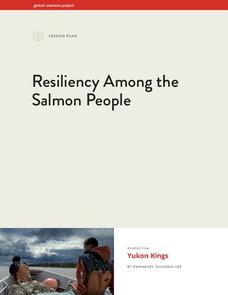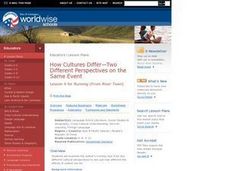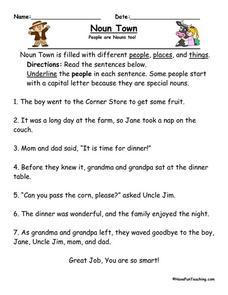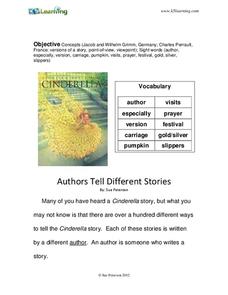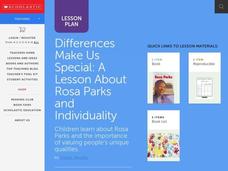Global Oneness Project
Resiliency Among the Salmon People
Is losing cultural traditions the cost of social progress, or should people make stronger efforts to preserve these traditions? High schoolers watch a short film about the native Yup'ik people in Alaska and how they handle the shifts in...
Facebook
Different Perspectives
What do people's social media profiles say about them? Explore diverse perspectives and digital citizenship in an activity designed with self-identity in mind. Pupils reflect on their own profiles, then collaborate to examine...
Just Health Action
How are Equality and Equity Different?
Equality does not equal equity. That's the take-away from a instructional activity that asks young people to consider what could be done to make a variety of situations more just, more equitable. After examining images that illustrate...
Curated OER
How Cultures Differ-Two Different Perspectives on the Same Event
Students examine the author's running race from two different cultural perspectives to see just how different the effects of culture can be. They practice thinking about an issue from different perspectives and create a script that can...
Curated OER
Everyone Has a Culture -- Everyone is Different
Students are shown various statements and respond to each as a class. They discuss the differences between different groups of people and why they behave differently as well. After completing a worksheet, they discover aspects of their...
Constitutional Rights Foundation
Refugees from the Caribbean: Cuban and Haitian “Boat People”
Should refugees fleeing poverty be allowed the same entrance into the United States as those fleeing persecution? High schoolers read about US foreign policy in the late 20th century regarding refugees from Cuba and Haiti, and engage in...
Curated OER
Creating Classroom Rules
Perfect for establishing classroom protocols, this activity gets even the youngest learners thinking about rules and their consequences. The lesson begins with a discussion and a reading of the poem Humpty Dumpty that gets youngsters...
Have Fun Teaching
Noun Town
Welcome to noun town where you will meet a number of different people, places, and things! Have kids practice identifying nouns by completing a great set of worksheets. There are 13 worksheets in the packet and each one provides practice...
Curated OER
Negative Space People
Learning about negative space can help kids see things in a whole new way. They use negative space and bright, primary colors to create an image of people in action. Each of the four squares will contain a single negative-space person...
Curated OER
Match the Words
Even if your kids aren't reading yet, they can become familiar with words by identifying two that are the same. Youngsters focus on the word same as they examine eight words and match them to their identical spellings. Challenge learners...
Newseum
Things Change, Things Stay the Same
Securing women the right to vote was a long time coming. Over the years, some aspects of the suffrage movement changed, and some things remained the same. Pupils research three time periods and collect evidence of key people, strategies,...
Curated OER
U.S. and Canada: How are We the Same? How are We Different?
Get high school geographers to compare and contrast Canada and the United States. They begin by drawing a freehand map of North America, then complete readings to gain insight into Canada. The text is not provided; however, another text...
Curated OER
How Cultures Differ - Two Different Perspectives on the Same Even
Young scholars explore the effects of culture through the story Running by Peter Hessler. In this geography and cultural lesson, students act as newspaper reporters covering the story of the race. Young scholars write newspaper articles...
WITS Program
Whoever You Are
Deep down, everyone is the same. Discuss the similarities and differences between people across cultures with a series of reading activities based on the beautiful story and illustrations in Whoever You Are by Mem Fox.
Jamestown-Yorktown Foundation
Making a Patriot Inquiry: Are Independence, Freedom, and Liberty the Same Thing?
As part of a study of the American Revolution, class members engage in an inquiry-based lesson that has them watch a scene from the play Slave Spy, examine multiple primary source documents, and then discuss the similarities and...
Curated OER
Collecting Data to Learn About the People Around You
Human graphs, anyone? Did you eat fruit today? What is your favorite costume? Have your K – 6 learners graph the responses. Early elementary grades may count and compare while upper grades compare responses of different groups or make...
K12 Reader
Two Viewpoints of the Same Event: Lee Surrenders to Grant, 1865
How did Union General Ulysses S. Grant view the surrender of Confederate General Robert E. Lee in 1865, which effectively ended the United States Civil War? After reading an excerpt from Grant's autobiography, your young historians will...
K5 Learning
Authors Tell Different Stories
The story of Cinderella is a popular one! So much so, there are multiple versions of the story being told around the world. With this collection of activities your young readers receive background information about two versions...
Curated OER
Three-Level Reading Guide- The Apaches: People of the Southwest
A reading guide designed for Jennifer Fleischner's nonfiction text, The Apaches: People of the Southwest, provides readers with three levels of comprehension questions meant to encourage higher-level thinking.
Curated OER
Differences Make Us Special
Students explore the similarities and differences among their classmates. They are introduced to the Civil Rights Movement-that all people be treated equally and fairly. Students discuss the importance of appreciating individual...
Arkansas Government
Creative Adventures with Literature - Whoever You Are
Celebrate our similarities and differences through multiple readings of Whoever you Are by Mem Fox. Readings are accompanied by a grand discussion, charts, creative art, dramatic, and music play to reinforce the uniqueness that is found...
Curated OER
Society - Timeline
Students look at a timeline of the development of different disabilities and discuss how different they all are. In this disabilities lesson plan, students then fill out a worksheet of examples of different kinds of disabilities.
Curated OER
One Step At a Time
Learners examine cultures in Africa. They discover culture includes behaviors, customs and actions. They examine how different people interpret things differently and practice seeing a situation from two points of view.
Foreign Policy Research Institute
Democracy Wall
How free are people in the United States, or in the world for that matter? The class reads and compares two articles that discuss levels of freedom enjoyed by different people around the globe. They discuss why some people have more...


